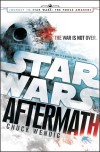Foundation's Fear
 What an odd book. I don't know that I expected it to be a carbon copy of one of Asimov's novels in the series, or even one that sounded like a Foundation novel, but what I found here was very different from my expectations.
What an odd book. I don't know that I expected it to be a carbon copy of one of Asimov's novels in the series, or even one that sounded like a Foundation novel, but what I found here was very different from my expectations.For one thing, Foundation's Fear has better characterization than anything Asimov ever wrote. The closest I ever got to feeling for any of the characters was during Dors' death in Forward the Foundation, and even then, it was more about the sense of loss than it was about how well Asimov created the characters. Benford, though, delved deeply into not just Seldon't character, but also Dors', as well as (no kidding) Joan of Arc and Voltaire.
Which brings me to the next part of the book that was unexpected. In Foundation's Fear, Benford explored the idea of simulated personalities stored on a computer mainframe, and didn't just cop out by creating new characters from scratch. Instead, he created fictional versions of Joan of Arc and Voltaire, who start out representing the voices of faith and reason in an educational debate, but then become something much larger, and more significant. They wind up being influential to Seldon's development of psychohistory, along with some proto-humans with whom he assimilates while on a vacation from Trantor to avoid assassination attempts.
Oh yeah, I forgot to mention that Seldon also assimilates with proto-humans on another world, which leads him to further develop his theory of psychohistory. So we can bring the count of unexpected aspects of this novel to three.
The whole book was a little odd, and those chunks of the story at first felt very out of place in the midst of a Foundation novel. Benford succeeded in bringing these threads together into a cohesive whole by the end of the book, but it was pretty jarring at times. Ultimately, the story is about robots and aliens and artificial intelligences, which was a bit at odds against how Asimov developed the themes behind the series. Asimov revealed at the end of Foundation and Earth that the Foundation had been orchestrated by robots, and even though it was strongly implied that Dors was a robot, it was never explicitly stated until the last third of Asimov's last book; in Foundation's Fear, there's a scene where Hari comes in and finds Dors with the skin of one arm peeled back so she can fix a damaged part in her wrist. It doesn't surprise him; he's seen her do this sort of thing before. But even if Benford hadn't made that big of a reveal, he writes his narrative to make it a certainty instead of a suspicion. It makes sense given the publication chronology -- by now followers of the series know she's a robot -- but for the timeline chronology, it makes the reveal too soon.
In addition, Benford's writing style is much different from Asimov's. Benford doesn't use as much dialogue, but he also devotes more time to characterization. Hari and Dors feel a little more real and less like two-dimensional lecturers, and the life he puts into Joan and Voltaire make the main characters -- even in his own book -- look like cardboard cutouts. His narrative is a bit drier than Asimov's (which I blame on the less dialogue), but if the trade-off is for better characters, then I can't complain.
I'm not sure if I would recommend this book, simply because it is so odd in its placement within Asimov's universe. I find it to be better written in parts, but I'm not sure if that would be enough to recommend it without hesitation. Given that the story falls within the timeframe between Prelude to Foundation and Forward the Foundation (two books that purists don't even consider to be essential to the storyline), there's not even that going for it. It's an interesting read, to be sure, but it doesn't feel necessary.






